By Colbee Cunningham, 2022 Global Ties U.S. Emerging Leader
My introduction to the world of public diplomacy came in perhaps the most unlikely of places: my hometown in rural Iowa. Surrounded by cornfields as far as the eye can see, I connected to the world through the only means accessible to me: language education. My natural affinity for Spanish led me to volunteer as a language partner with several Spanish-speaking, English as a second language (ESL), students at my high school. What started as mutually beneficial exchanges quickly blossomed into unforgettable friendships. Over the course of four years, my ESL peers and I broke down language barriers and cultural stereotypes. We chuckled about false cognates, tried to wrap our heads around different grammar structures, and, most importantly, we learned how to use our unique linguistic and cultural backgrounds as a tool to help others. At the time, I didn’t know that I was engaging in citizen diplomacy – I was simply having fun.
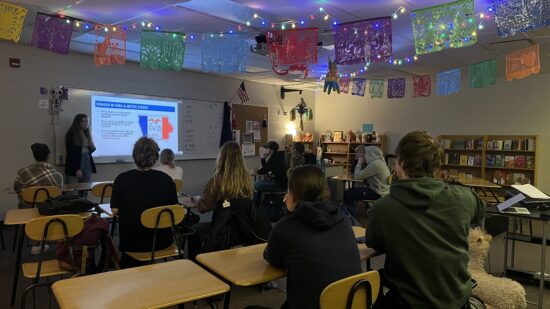
For her service-learning project, Colbee facilitated a Hispanic Culture and Spanish language workshop for two Spanish classes at Colfax-Mingo High School in rural Iowa.
I carried the lessons my ESL friends taught me into my studies at Simpson College and my early career. Eager to further my intercultural and language abilities, I sought out local opportunities for global engagement and landed an internship as a Marketing Communications intern at Iowa International Center (IIC). My internship at IIC was the spark that ignited my passion for public diplomacy. During my internship at IIC, I served as an advocate for public diplomacy and intercultural exchange by spearheading the organization’s communication channels. Staying consistent with IIC’s mission, I helped “welcome the world to Iowa” by developing International Visitor Leadership Program (IVLP) programming, facilitating webinars, and interviewing leaders from our local communities. This internship not only exposed me to the vibrant international community in my home state, it also allowed me to combine my passion for international exchange with my aptitude for journalism in order to make a practical difference in the lives of others. Upon completion of this internship, I knew that I wanted nothing more than to dedicate my career to fostering intercultural competence and enriching communities across the globe through exchange programs.
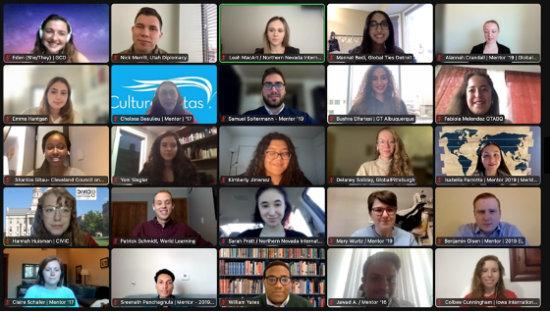
A snapshot of Colbee (bottom right) and her fellow Global Ties U.S. Emerging Leaders.
In conjunction with my internship at IIC, my supervisor Kassi Bailey nominated me to take part in the 2022 Global Ties U.S. Emerging Leaders Program – an honor for which I will always be grateful. This one-of-a-kind program is dedicated to promoting the next generation of diverse leaders in international affairs by providing unique professional development and mentorship opportunities. To say that the Emerging Leaders Program has had a profound impact on my professional aspirations and career prospects would be an understatement. Not only did this program expose me to a wealth of opportunities in the field of public diplomacy, but it provided me with the resources necessary to take advantage of such opportunities. Global Ties U.S. assisted our cohort in creating a career action plan, crafting personal statements for fellowship applications, and more. Not to mention, we gained access to the Global Ties Network – the largest and most-established citizen diplomacy network in the United States – and were given the opportunity to interact with a wide array of public diplomacy professionals – including Global Ties U.S. CEO Katherine Brown, representatives from the U.S. Department of State, and our very own alumni mentor.
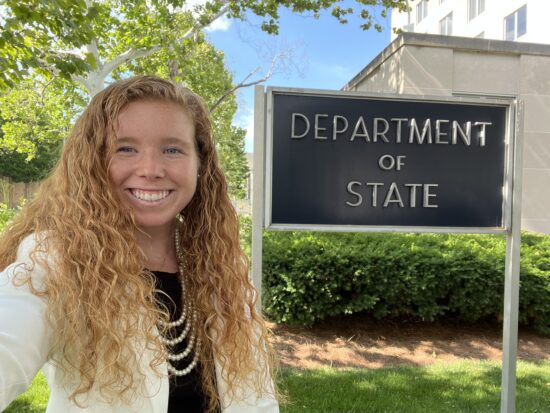
As part of the Rangel Summer Enrichment Program, Colbee had the opportunity to visit the U.S. Department of State in Washington, DC., where she hopes to eventually work as a Public Diplomacy Foreign Service Officer.
Due to the virtual nature of my Emerging Leaders Program, I was able to remotely participate during my consecutive semester abroad experiences in Spain and the United Arab Emirates. This created a unique dynamic through which I had the opportunity to simultaneously learn public diplomacy best practices and to implement them in my everyday life as an expatriate. In addition to gaining an appreciation for Spanish and Emirati cultures, I met individuals from nearly 100 countries, each of whom was eager to share their culture with me. I learned about decolonization from Mauritians and post-Soviet revolutions from Kazakhs. I tasted mouth-watering Colombian arepas and partook in a traditional Kuwaiti coffee ceremony. At the same time, I served as a U.S. cultural ambassador to my international peers, most of whom had never met anyone from the United States before. I taught them U.S. idioms, made them my grandma’s famous “Cheerio candy,” and showed them that there is much more to the U.S. than what is shown in movies. These repeated intercultural exchanges gave me invaluable in-person exchange expertise and resolidified my desire to pursue a career in public diplomacy. At the conclusion of my time abroad, I returned to the United States with a newfound sense of purpose and a desire to share my love for cross-cultural exchange with those around me.
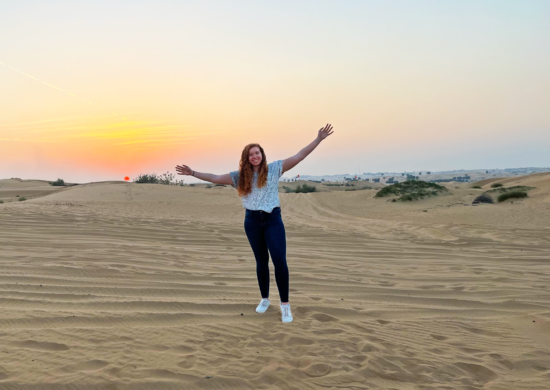
Colbee spent the Fall 2022 semester studying abroad at the American University in Dubai as part of the William Jefferson Clinton scholarship.
In addition to enhancing participants’ understanding of public diplomacy, a main component of the Emerging Leaders Program is its emphasis on promoting public diplomacy in the communities of its participants through service learning. As part of the program, each Emerging Leader is required to create, organize, and execute a public diplomacy-oriented service project in their local community. For my project, I facilitated a Hispanic Culture and Spanish language workshop for two upper-level Spanish classes at Colfax-Mingo High School in rural Iowa.
As part of the workshop, I gave an interactive presentation on the benefits of language learning, intercultural exchange, and study abroad. I went on to explain the cognitive, social, and professional benefits of learning Spanish and shared some of my favorite language-learning resources. I finished my presentation by sharing my personal language-learning testimony and explaining how my personal acquisition of the Spanish language has been one of the best decisions I’ve ever made. After my presentation, I held a Q&A with the students who asked questions ranging from “What was your favorite food in Spain?” to “Which colleges in Iowa offer Spanish as a major/minor?” All things considered, I am certain that my service-learning project was a mutually-beneficial experience that helped me improve my aptitude for public diplomacy and helped the high school students broaden their horizons. Many of the students I spoke with told me that it was really neat to hear from someone from their rural community who has pursued a global career and that it inspired them to do the same.
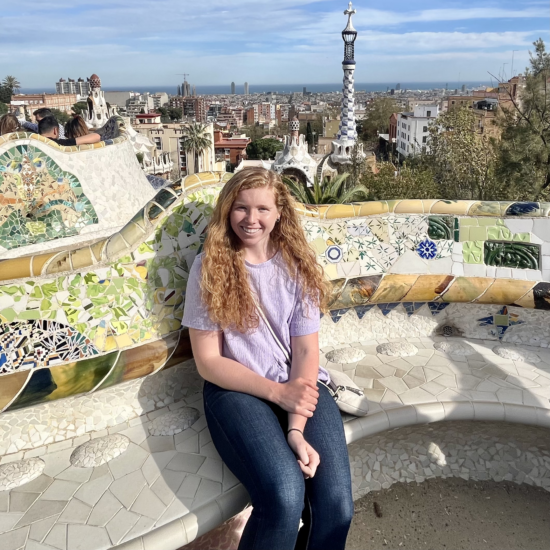
During her semester abroad in Spain, Colbee had the opportunity to gain an in-depth understanding of Spanish history, culture, and language. She also traveled extensively throughout Spain, including a trip to Park Güell in Barcelona.
While the Emerging Leaders Program has played an instrumental role in shaping my career prospects, it has had an even more profound impact on my confidence and morale. This program has taught me that I offer a valuable – and oftentimes underrepresented – perspective on U.S. public diplomacy and global affairs as a young, globally-minded individual from a rural community. With this new mindset, I’ve sought out any and every opportunity to enhance my aptitude for public diplomacy and strengthen my understanding of U.S. foreign affairs. Since participating in the Emerging Leaders Program, I have held positions with the U.S. Agency for International Development (USAID), the U.S. Department of Agriculture, and the Institute of International Education. I’ve also participated in the Charles B. Rangel International Affairs Summer Enrichment Program and the Youth International Leadership Initiative (YILI), two programs designed to prepare diverse young people for careers of international service. My next career endeavor will be serving as a Fulbright English Teaching Assistant in Bucaramanga, Colombia for the 2023-24 academic year.
While these experiences have taught me many things, my main takeaway has been the zeal and commitment of my fellow participants. I have been both humbled and honored to learn alongside so many young, globally-minded individuals who share my love for international affairs and intercultural exchange. Not only do these motivated individuals genuinely want to strengthen their understanding of U.S. foreign policy, but, like me, they want to leverage this knowledge to help make the world a better place. If my fellow Emerging Leaders, Rangel Scholars, and YILI alum are any indication, there is no doubt in my mind that the future of U.S. public diplomacy and foreign affairs is in good hands.
